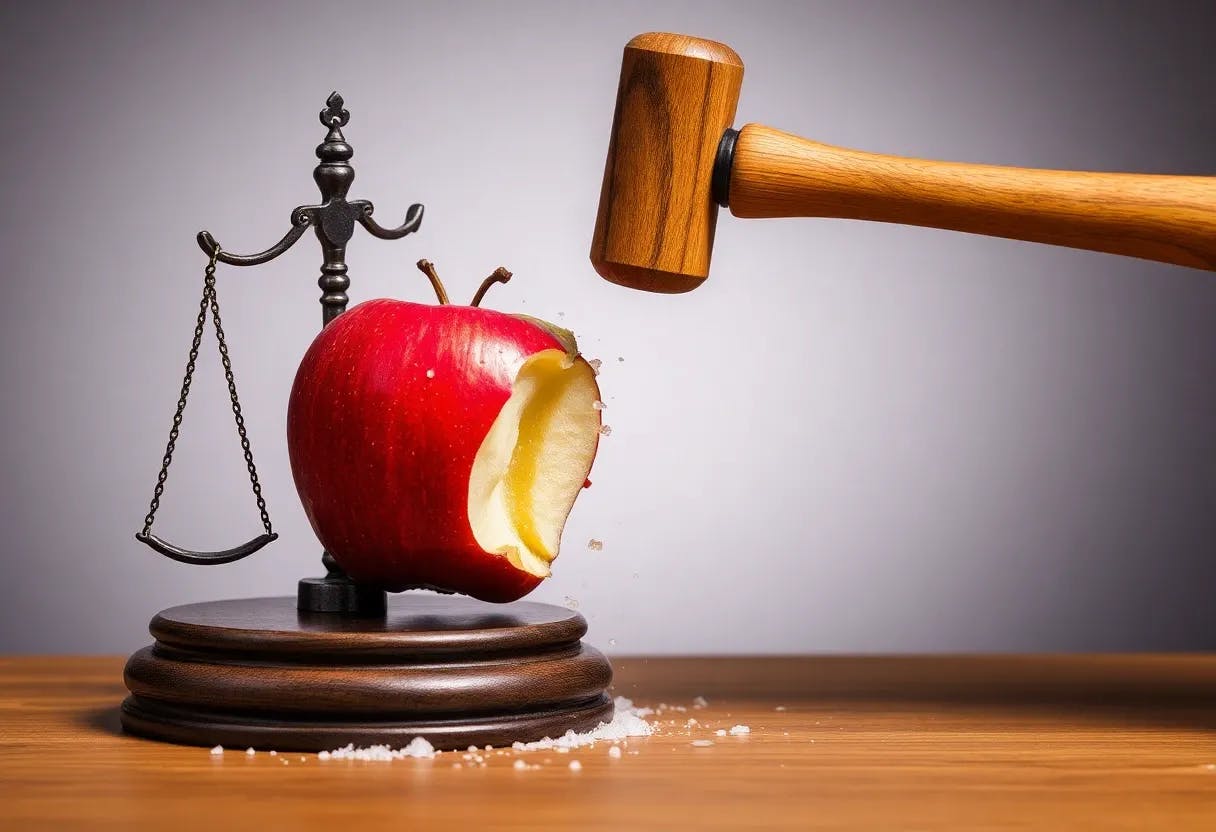UNITED STATES DISTRICT COURT FOR THE DISTRICT OF COLUMBIA
UNITED STATES OF AMERICA, et al.,
Plaintiffs,
v.
GOOGLE LLC,
Defendant.
Case No. 20-cv-3010 (APM)
STATE OF COLORADO, et al.,
Plaintiffs,
v.
GOOGLE LLC,
Defendant.
Case No. 20-cv-3715 (APM)
ORDER
Before the court is Apple Inc.’s Emergency Motion for Stay, or in the Alternative, for Miscellaneous Relief, ECF No. 1158 [hereinafter Apple’s Mot.]. Apple asks the court to stay these remedial proceedings pending its appeal of the court’s Order denying Apple’s Motion for Limited Intervention, ECF No. 1153. “A stay is an ‘intrusion into the ordinary processes of administration and judicial review,’ and accordingly ‘is not a matter of right, even if irreparable injury might otherwise result.’” Nken v. Holder, 556 U.S. 418, 427 (2009) (citations omitted). “The party requesting a stay bears the burden of showing that the circumstances justify an exercise of [judicial] discretion.” Id. at 433–34. (citations omitted). Because Apple has not satisfied the “stringent requirements” for obtaining the “extraordinary relief” of a stay pending appeal, its motion is denied. Citizens for Resp. & Ethics in Washington (CREW) v. FEC, 904 F.3d 1014, 1016–17 (D.C. Cir. 2018).
First, Apple has not established a likelihood of success on the merits—“one of the two ‘most critical’ prongs of the test for a stay.” Id. at 1017 (quoting Nken, 556 U.S. at 434). Apple does not contend that the court applied the wrong legal standard or failed to consider “all the circumstances” in deciding Apple’s Motion for Limited Intervention. Campaign Legal Ctr. v. FEC, 68 F.4th 607, 611 (D.C. Cir. 2023) (citation omitted). Nor does Apple explain why the court clearly erred in finding, among other things, that Plaintiffs’ Proposed Remedy Framework revealed the potential inadequacies in Google’s representation 76 days before Apple moved to intervene and that granting intervention would substantially prejudice the existing parties. Id. at 610. Instead, Apple simply reasserts its position that “Apple moved to intervene promptly once it became clear its interests were no longer adequately protected—that is, shortly after the parties filed proposed final judgments[.]” Apple’s Mot. at 3. Such a conclusory assertion fails to demonstrate a “likelihood” of success on the merits, and certainly not a “substantial” one. CREW, 904 F.3d at 1017–18 (citation omitted).
Apple fares no better as to the second “critical” factor—showing irreparable harm absent a stay. Id. at 1019 (citing Nken, 556 U.S. at 434). “A party moving for a stay is required to demonstrate that the injury claimed is ‘both certain and great.’” Cuomo v. U.S. Nuclear Regul. Comm’n, 772 F.2d 972, 976 (D.C. Cir. 1985) (quoting Wisconsin Gas Co. v. FERC, 758 F.2d 669, 674 (D.C. Cir. 1985)). Here, Apple claims that it “will suffer clear and substantial irreparable harm if it is unable to participate in the remedies phase” because it will be left “without the ability to defend its right” to contract with Google. Apple’s Mot. at 4–5. As a preliminary matter, the court notes that Apple has not been left without any ability to defend its contractual interests, because the court has granted it leave to participate as amicus curiae. Moreover, Apple intends to file a motion to expedite consideration of its appeal, which—if granted—would likely “permit resolution of Apple’s intervention before the remedies trial,” as Apple acknowledges. Id. at 2.
In any event, Apple (again) fails to provide any specifics. It does not explain why party status is necessary to offer the evidence it wishes to present, or even how that evidence will differ from what the court already heard during the liability phase. It likewise fails to identify any daylight between the remedy Google has proposed and its own preferred remedy. Lacking such information, the court cannot find that Apple will suffer the “certain and great” harm required to justify a stay. Cuomo, 772 F.2d at 976; see M3 USA Corp. v. Qamoum, No. 20-cv-2903 (RDM), 2021 WL 2324753, at *19 (D.D.C. June 7, 2021) (“To demonstrate irreparable injury, a [party] must show that it will suffer harm that is more than simply irretrievable; it must also be serious in terms of its effect on the [party].” (internal quotation marks and citations omitted)); see also Yankton Sioux Tribe v. Bernhardt, No. 03-cv-1603 (TFH), 2019 WL 3753616, at *5 (D.D.C. Aug. 8, 2019) (finding no irreparable harm where the movant “d[id] not allege any specific effects that it [would] suffer if a stay [was] not granted” and “provide[d] no support, for example through an affidavit or declaration, for its assertions”).
Finally, the harm to the existing parties and the public interest weigh heavily against a stay. See Nken, 556 U.S. at 435 (“These factors merge when the Government is the opposing party.”); accord Apple’s Mot. at 5 (analyzing these factors together). As the court stated in its order denying intervention, this case has been pending for over four years, and the delay from postponing the evidentiary hearing would be months, not weeks. Order, ECF No. 1153 at 17. What’s more, the court has concluded that Google violated federal antitrust law by entering into exclusive search distribution agreements with various companies (including Apple) to achieve and maintain a monopoly in both the general search services market and the general text advertising market. Redacted Mem. Op., ECF No. 1033, at 276. Preserving the status quo by granting a stay, as Apple urges, would only perpetuate this unlawful activity and is therefore contrary to the public interest. Compare Sec. Indus. Ass’n v. Bd. of Governors of Fed. Rsrv. Sys., 628 F. Supp. 1438, 1440, 1442 (D.D.C. 1986) (denying motion for stay because, “[a]t bottom, the [movant] is making the extraordinary request that this Court maintain a status quo that the Court has concluded is illegal”), with Washington Metro. Area Transit Comm’n v. Holiday Tours, Inc., 559 F.2d 841, 843, 844 (D.C. Cir. 1977) (stating that “[a]n order maintaining the status quo is appropriate” when “little if any harm will befall other interested persons or the public” and ultimately granting motion for stay because “this is not a case where the Commission has ruled that the service performed by appellant is contrary to the public interest”); see also Virginia Petroleum Jobbers Ass’n v. Fed. Power Comm’n, 259 F.2d 921, 925 (D.C. Cir. 1958) (“The interests of private litigants must give way to the realization of public purposes.”).
For the foregoing reasons, the court denies Apple’s Emergency Motion for Stay, or in the Alternative, for Miscellaneous Relief, ECF No. 1158.
Dated: February 2, 2025











